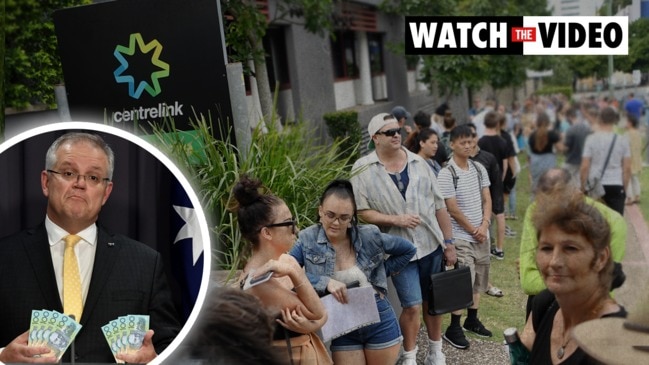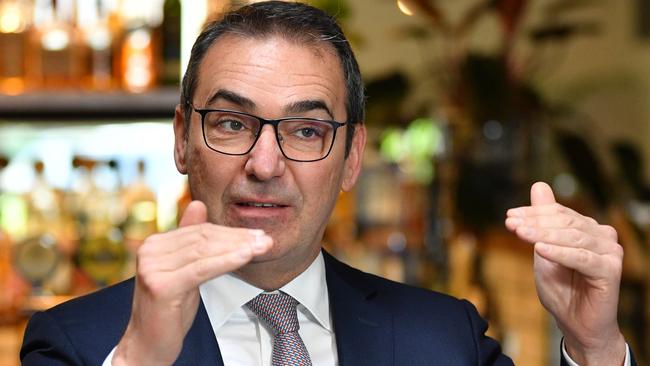Daniel Wills: Lower water bills of $200 a year per household is the biggest thing Premier Steven Marshall has done for re-election
Steven Marshall faced damaging claims he’s broken his key lower costs pledge but big cuts now coming on water bills are a chance to reclaim lost faith, writes Daniel Wills.

Opinion
Don't miss out on the headlines from Opinion. Followed categories will be added to My News.
- Revealed: how much you’ll save on water bills
- Are you getting the most from your Advertiser subscription?
Elections are won in the middle, and often decided by the people who take the least interest in the day-to-day horserace of pointy politics.
The two-child, two-car suburban family with a big mortgage is the classic so-called “soft voter”. They make their minds up at the last minute, have no strong party loyalty and make decisions from the hip pocket.
This week’s announcement of big water bill savings in the order of $200 for the average household each year might be the single biggest thing Premier Steven Marshall has done to help secure his re-election.
If SA Water’s online estimator is to trusted, the savings for a family home with a decent garden and lots of washing will be double that.

It must be noted that a lot of the savings flow automatically, as SA Water cuts its spending and pays lower interest rates. But the Government has made a key, if complicated, call on SA Water’s regulated asset base that pushed prices down more.
In contrast with Labor, Mr Marshall can simply say that bills went in the right direction under his watch after years of water torture.
This decision won’t dominate the news cycle for months in the way that the land tax debacle did, but it will be quietly noticed as water bills come across SA’s kitchen tables every quarter for the next two years.
In the lead up to the last state election in 2018, hard heads on both sides said cost of living resonated strongly in focus groups and polls.
While much media commentary was weighted towards issues around climate change and renewable energy or the social equity movement of the day, jobs and cost of living rose to the top as something that would swing the 30 per cent who count.
You could see this clearly in the pitch that Premier Steven Marshall made and the “more jobs, lower costs, better services” mantra that dominated his campaign. It also becomes a test that will be used to measure the success of his first term.
In the early stages of his time in the big chair, Mr Marshall moved to tick off the cost savings that he promised to implement. Emergency Services Levy bills virtually halved and payroll tax was dramatically cut.
The public response was muted.
Rather than a cause for new celebration, it was banked by households as a fair price paid for the faith they had shown by finally flipping the government after 16 years.
Mr Marshall also inherited a hefty drop in compulsory third party insurance premiums, a big part of rego bills, set in motion by the Motor Accident Commission privatisations Labor triggered in its last years.
The first Budget of Mr Marshall’s term was all about being seen to keep job, costs and services promises.
But that narrative hit a snag.
With GST returns tanking last year, Treasurer Rob Lucas faced the risk of a State Budget in deficit. That would have dealt a major blow to the economic credentials of Mr Marshall’s new government.
While work was done to make savings, there was also a significant one-off rise in a range of fees and charges. Mr Lucas sought to contain them to areas that don’t have a widespread household hit – such as speeding fines and mining licences – but nonetheless gave Labor an opening.
Believe it or not, lots of things have become dramatically cheaper in the past decade. Electronic goods such as TVs, cars and even most groceries take up less of the pay check than they ever have. Interest rates are down and a global price war over oil makes getting around a lot cheaper.
But that is seldom a feeling that aspirational households have. Pushing themselves to fund a home extension or holidays and school fees, many are stretched and feel the cost of everything just keeps going up.
MORE NEWS
PM puts footy at heart of COVID relaxation
Borders open, 300 people per venues – What’s changing in SA
Tiny council spends $9000 on CEO investigation
That was fertile ground for Labor through the middle part of last year. The Government was, in fact, making big increases to many fees and fines, and Labor married the two in a surgical PR campaign.
Anecdotally, many even believed the Government was massively spiking costs in areas where it actually wasn’t, such as public transport. If that wasn’t bad enough for Mr Marshall, there came a more poisonous sting. He promised lower costs, but people were seeing and feeling that things were going up.
Many felt he’d broken a key promise. If they couldn’t trust him on that, many fairly reasoned, everything else he said had to be doubted.
Lower water bills are a big down payment on reclaiming that credibility.
It’s not something Mr Marshall pitched at the last election and implemented as instructed, nor something you have to vote for him again to get.
It starts in a few weeks.
Alone, it’s not enough to win the next political battle over cost of living. But it’s a much stronger foundation on which to build the coming and usually decisive charge into struggling SA suburbia.
